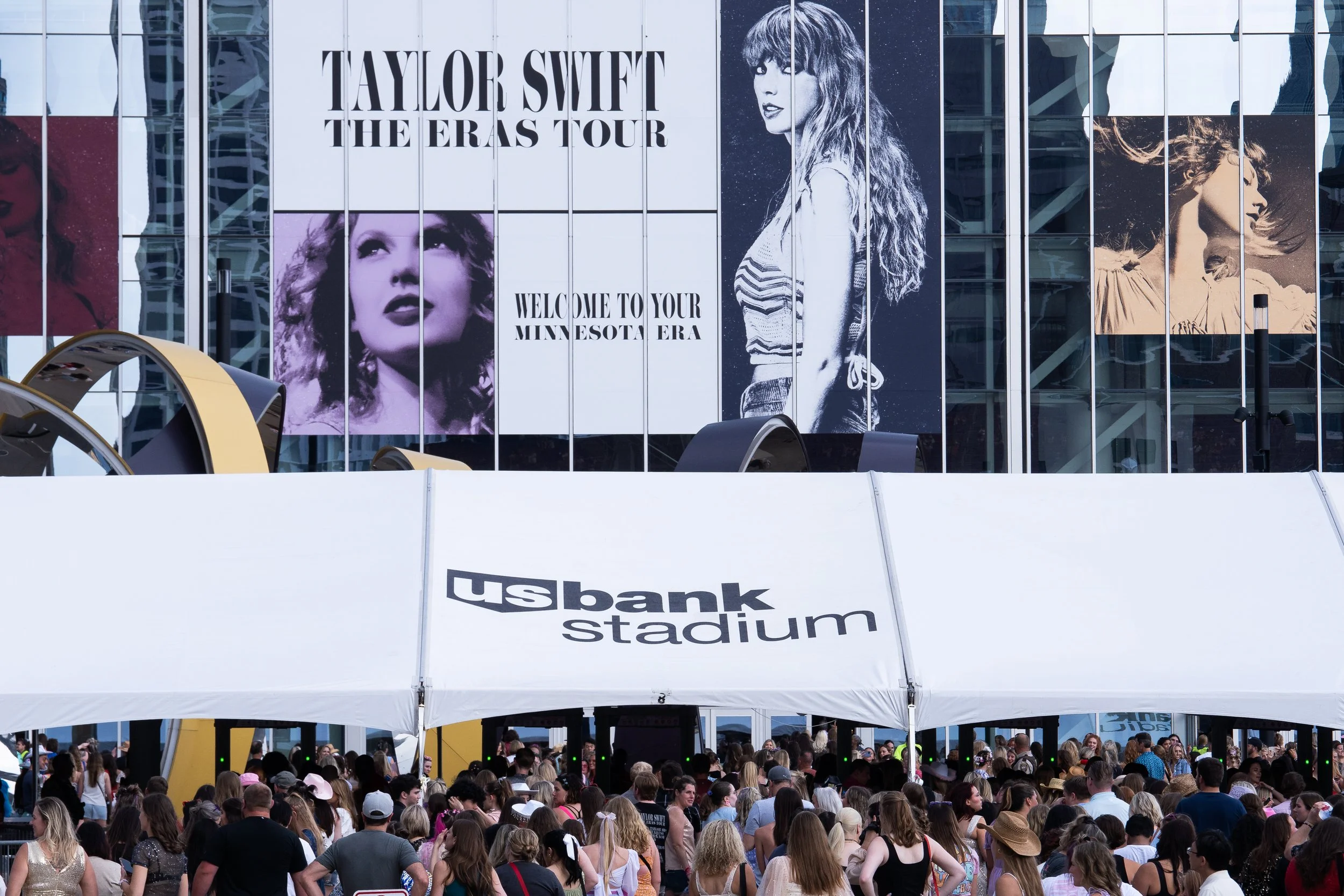Taylor Swift: Capitalism and Industry Standards
Taylor Swift Eras Tour fans in Downtown East in Minneapolis for the first of two shows on the tour. Photo by Chad Davis via Flickr.
For those living under a rock, Taylor Swift is an American pop icon, known for her catchy songs and lyricism. After releasing her self-titled debut album in 2006, Taylor has continued to stay intensely relevant in today's society. From changing genres, re-releasing old songs to going on tour and cranking out new albums, you can’t help but wonder, “Okay! Are we done now? Or…”
Her albums have always been a huge deal within the world of music, and within the past few years, she’s gained even more traction from her old work by re-releasing them with the distinction of “Taylor’s Version” after her former label, Big Machine Records, sold her music to a private firm. Since then, Swift has bought the rights to all of her old masters in the spring of 2025.
Renowned for her musical “eras,” her album revamp reignited excitement in fans and renewed their interest in her past work. Swift only grew this attraction more by teasing songs from the vault collection, which were songs from that specific record that had not been released yet.
This is a great example of one of Swift’s impressive marketing tactics. The whole story about owning her own music is sometimes not enough for fans to go out to buy or download a whole new record, but if there are unreleased songs on the album as well, then more people are inclined.
Swift also released multiple different variants of her albums, encouraging people to go out and buy more copies. Because of social media, people will inevitably post about it, gaining Swift even more traction.
Swift herself has fully impacted the U.S. economy, especially with her “Taylor’s Version” studio records and her latest tour.
“The Eras Tour” is the highest-grossing tour of all time, surpassing $2 billion in revenue. Not only were the tickets enough to drive the economy through the roof, but this tour also drove local businesses because of the amount of purchasing that was being done for this tour.
With concert fashion on the rise, people tried to recreate certain tour outfits, her old music videos and even emulate some of her own eras. There were also the hotel bookings, restaurants and of course, the pricey tickets.
This three-and-a-half-hour-long show resulted in not only an insane public demand for tickets, but also a plethora of anti-scalping laws, lots of Ticketmaster monopolies and a literal earthquake.
She didn’t stop there, however, and while on her over-year-long tour run, she also came out with her eleventh studio album, “The Tortured Poets Department,” which has over 30 songs, which she announced during her 14th Grammy win.
Many people were actually quite upset about this announcement. Not because they didn’t want another album, but because they felt like she had just taken the spotlight away from other artists that night, and felt like Swift was using this album as a “cash grab.”
And when the album was released only a few short months later, it was safe to say that not all fans were impressed. The album, double the size of a regular studio album, felt very rushed, and it was noticeable that Taylor was eager to release it and get back up on the charts as soon as possible. Chris Murphy [@christress] on X made a remark that the situation “[is] almost like if you produce too much... too fast... in a brazen attempt to completely saturate and dominate a market rather than having something important or even halfway interesting to say…”
It seems that Swift’s newer tracks are delivering more quantity over quality and the songs are losing their poetic and calculated charm. At this point, it feels like she is just throwing songs with "relatable” content to keep her audience engaged. The latest example of this is her newest album, “The Life of a Showgirl,” which Swift has been teasing for the past few months.
The album is being publicly scrutinized on social media because of some of the lyrics, like “ Did you girl-boss too close too close to the sun?” from the track “CANCELLED!,” and Swift’s inadequate attempt to relate to her younger audience.
At this point, she has such an established, loyal fan base that even if the music she's producing isn’t “Taylor Swift quality,” people are still going to stream it because of the name and buy all of her merchandise because it is “limited edition.” People are so consumed with Swift as an icon and figure that they disregard her as an artist.
The big takeaway? For most artists, their main concern has shifted from music to their overall public image and platform, because without a strong platform, there’s not much left to stand on. Swift has spent years gaining the fandom that she has today, and it basically ensures her a top spot on the charts almost consistently.
Many other artists alongside Swift have gotten so big to the point where the lines are blurred between what music we actually like of theirs, and what songs we listen to just because they produced it. Fans should start separating their idols from music and lowering their expectations because not every album is going to be their best, and just because they can produce content consistently, it does not mean that what they make will always be high-quality work.
